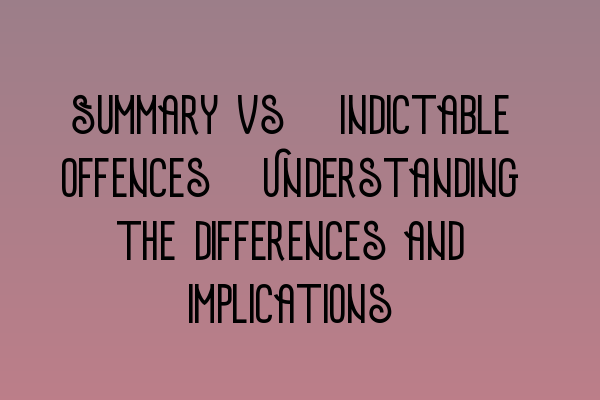Summary vs. Indictable offences: Understanding the differences and implications
When it comes to the classification of criminal offences in the United Kingdom, understanding the differences between summary and indictable offences is crucial. As a solicitor specializing in criminal law, it is important to have a deep understanding of these distinctions to properly represent your clients and navigate the legal system effectively.
Summary Offences
A summary offence, also known as a minor offence, is a less serious criminal offence that is typically tried in a Magistrates’ Court. These types of offences include matters such as petty theft, public disorder, and minor traffic violations. Summary offences are generally punishable by a fine or a limited period of imprisonment, typically up to six months.
It is important to note that summary offences cannot be heard by a jury and are instead adjudicated by a magistrate or a panel of magistrates. The process tends to be more straightforward and less time-consuming compared to indictable offences.
If you are preparing for the SQE 1 exam, it is essential to familiarize yourself with summary offences and their key characteristics. You can also benefit from practicing SQE 1 exam questions related to this topic to enhance your understanding and test your knowledge. Check out these SQE 1 Practice Exam Questions to get started.
Indictable Offences
Indictable offences are more serious criminal offences and are typically heard in the Crown Court. Examples of indictable offences include murder, robbery, and drug trafficking. These offences require a more thorough investigation and involve complex legal procedures.
If a defendant is charged with an indictable offence, they have the right to choose whether their case will be tried by a judge and jury or by a judge alone. This decision is an important strategic choice that can significantly impact the outcome of the case.
Preparing for the SQE 2 exam? Familiarize yourself with the intricacies of indictable offences by enrolling in SQE 2 preparation courses. These courses will help you develop the necessary skills and knowledge to handle complex cases effectively. Click here to learn more about SQE 2 Preparation Courses.
Summary vs. Indictable: Key Differences and Implications
The differences between summary and indictable offences extend beyond just the courtroom setting. The classification of an offence can have significant implications for both the defendant and the legal proceedings:
- Punishment: Summary offences are typically punishable by a fine or a short prison sentence, while indictable offences carry more severe penalties, including longer prison terms.
- Procedure: Summary offences are resolved relatively quickly and are heard by a magistrate, while indictable offences involve more complex legal proceedings and can be heard in the Crown Court.
- Juries: Summary offences are decided by a magistrate or a panel of magistrates, whereas indictable offences can be heard by a jury or a judge alone.
- Evidence: The rules regarding the presentation and admissibility of evidence may differ between summary and indictable offences, requiring solicitors to be well-versed in the specific requirements for each type of offence.
In some cases, a summary offence may initially be charged, but as the case progresses and more evidence is uncovered, it could be reclassified as an indictable offence. This highlights the importance of thorough investigation and ongoing assessment of charges.
If you are preparing for the SQE 1 exam, consider taking practice mocks such as FLK1 and FLK2 to further enhance your understanding of summary and indictable offences. These SQE 1 Practice Mocks can provide invaluable insights and help you identify areas for improvement. Find out more about these practice mocks here.
Stay Informed about SQE Exam Dates
Whether you are focusing on SQE 1 or SQE 2, it is important to keep track of the upcoming SRA SQE exam dates. Being aware of the exam schedule will allow you to plan your study and preparation effectively. To access the latest SQE exam dates, visit the official page here.
